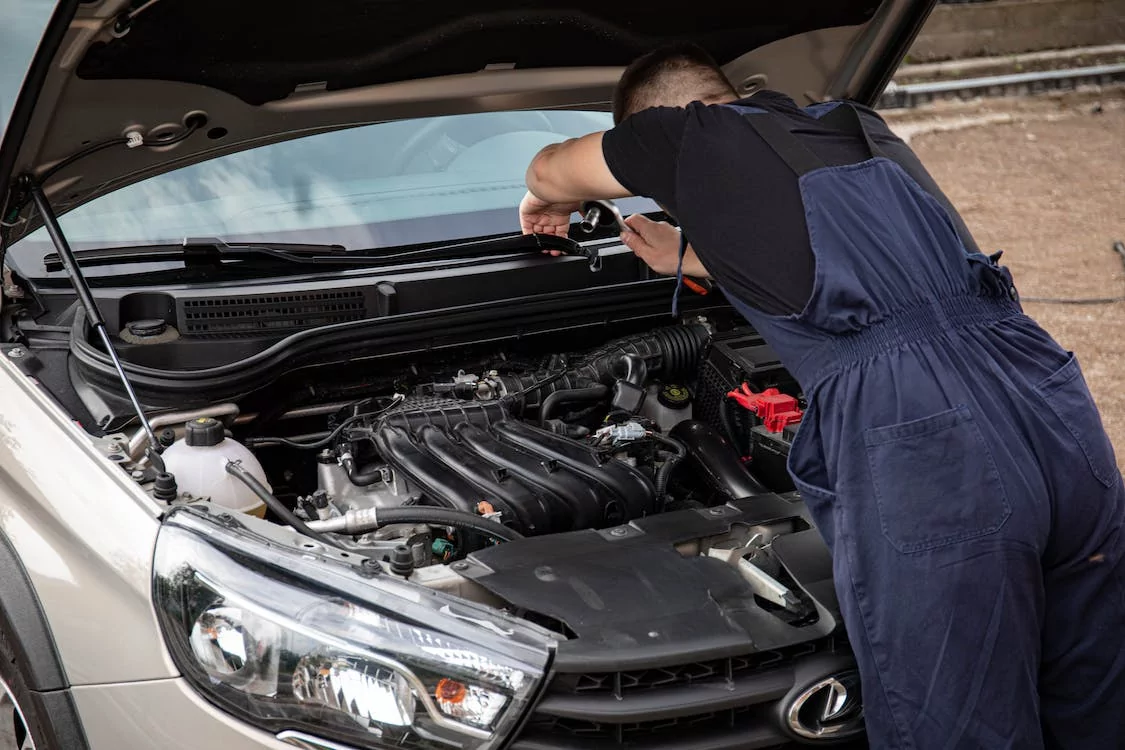The prevalence of car repair scams is higher among the elderly because of their financial disposition and age-related problems. Money lost to repair scams can take a very long time to recover.
Let’s review some statistics on car ownership:
- In 2020, about 92% of American families owned at least one automobile, up from 90.9 in 2015.
- In 2011, about two-thirds of new-car purchases were made by adults over 50.
- Only 12% of households with adults over 65 have no car, and families with adults aged 35‐64 are mostly likely to have access to at least one car.
Most seniors quit driving due to issues with health and aging (e.g., poor vision). On average, a US driver aged 70 to 74 has a driving life expectancy of about 11 years. Unfortunately, some elderly drivers are more susceptible to scams, and scammers are getting smarter each day. This blog post will look at the most common car repair scams targeting seniors and how to avoid them.
Table of contents
- How to Choose an Auto Repair Shop
- How to Avoid Scams
- Reasons Seniors Are Prone to Scams
- Tactics Mechanic Scammers Use on the Elderly
- Effective Ways to Avoid Repair Scams
- What to Do if You’ve Been Scammed
How to Choose an Auto Repair Shop
According to research, there were about 234,700 auto repair and maintenance shops in the US in the fourth quarter of 2020.
Auto shops typically offer various services, from oil changes and tune-ups to more complex repairs like engine and transmission work. Some shops specialize in specific repairs, while others provide a more general selection of services.
There are a variety of auto repair shops, so selecting the best one can be a daunting task. To find the right shop, you need to weigh the pros and cons first. Here are some crucial points that can help you choose. But, first, let’s understand the types of shops.
Types of Auto Repair Shops
There are four main types of auto repair shops.
Dealerships
Dealerships are an excellent option for a complex repair situation or a luxury or high-end vehicle. They have the latest tools and technologies, and the staff receive firsthand manufacturer training. However, dealerships can be pretty expensive.
According to a study by Cox Automotive Service Industry in 2021, 34% of car owners prefer dealership repair services.
Independent Garages
Independents are an excellent middle ground. They’re usually more affordable than dealerships, but they still have trained and skilled staff. Many independents have years of experience working on all sorts of cars.
In a survey by Consumer Reports, car owners were more satisfied with independent repair services than those of any other type of shop.
Specialty Shops
Specialty shops focus on repairing a specific type of vehicle, such as luxury cars or supercars. They also work on specialty repairs that need outstanding expertise, making them the best for stubborn repair jobs. They usually have a more limited selection of parts and accessories, but they can often provide a higher level of service.
Auto Repair Chains
Auto repair chains have multiple locations and offer various auto repair services. These shops are typically part of a franchise and provide standardized services.
Online Automobile Repair Shops (Mobile Mechanics)
With the enhancement of technology, mobile mechanics are becoming increasingly popular. Since you don’t have to leave your home, they are a cheaper and more convenient option. They typically offer a wide variety of new and old parts and accessories, saving you time and money.
How to Avoid Scams
Here are some things to check in a shop to avoid getting scammed:
- Ensure the shop is certified. A good auto repair shop is certified by the American Accreditation Association (AAA) and the National Institute for Automotive Service Excellence (ASE). The certification shows that the shop met high-level standards of services.
- Confirm the warranty. Before taking your car to a shop, check its warranty terms. Most reputable shops will offer a warranty on its repair services.
- Check its legitimacy or reputation. According to Forbes, 90% of consumers check online reviews before visiting the business. So before going to the repair facility, have the important facts about them. You can check the shop’s rating on the Better Business Bureau or the Attorney General’s Office. In addition, you can ask your friends, family, and coworkers for their opinions, if any, about the shop.
- Shop aesthetics. You can’t solely rely on the shop’s appearance to verify its legitimacy, although general cleanliness could show attention to detail.
- The number of years in business. Check how long the shop has been in business, as this can prove its credibility. Of course, this does not imply that you should steer clear from shops with a short operation history altogether. The longer the years, the fewer the chances of being scammed.
Reasons Seniors Are Prone to Scams

According to Consumer Affairs, the elderly are defrauded yearly by over $3 billion, with those over 80 years reporting higher losses. You may be wondering why scammers are targeting you if you’re an older adult. Here are some of the reasons:
More Trusting Than Younger People
Scammers often target seniors because they may be more trusting and welcoming. According to research, some people become more trusting as they age. Gen X, millennials, and baby boomers have different levels of trust.
Compared to younger adults, the older adults do not have a strong anterior insula activity. The anterior insula increases awareness of physical and emotional cues during a given situation for better decision-making. So older adults tend to miss the facial expressions of untrustworthy people. If someone breaks their trust, they can suffer devastating health effects.
Loneliness and Social Isolation
Scammers take advantage of their loneliness and need for companionship. So the con artist interacts with them under the guise of sincerity and friendship, hoping to get exploitable information. But since these lonely seniors hardly keep in touch with their family and friends, there’s no one to validate their decisions or give them a second opinion. This increases the chance of scammers to succeed.
According to research, loneliness affects 1 in 4 older adults in high-income countries. Seniors who live alone or who don’t have a strong social support network are more likely to fall victim to scammers.
If you have an older adult in your family, it’s crucial to be aware of the risks of scams. First, keep an open dialogue with them about their finances and watch for any unusual activity. Contact the authorities immediately if you suspect someone has scammed your loved one.
Seniors Have the Highest Median Net Worth
Your wealth may increase as you age because you either get a higher salary, use your money wisely, or acquire more assets. According to research, adults over 50 hold 83% of the wealth in America. Families with elderly members in their 70s and 80s have the highest average net worth. For this reason, seniors become easy targets for scams.
Age-Associated Financial Vulnerability (AAFV)
AAFV is a complex issue that needs to be taken seriously, especially by those who care for seniors. Even when dementia or other neurodegenerative diseases are not present, aging can change the brain. Older people may see a change in their decision-making pattern when it comes to financial matters.
Poor Physical and Mental Health
According to the World Health Organization (WHO), over 20% of persons aged 60 and older have a mental or neurological condition, and 2 in 5 adults aged 65 and above have a disability.
As you age, you may find your body becoming prone to physical and mental conditions such as the following:
- hearing loss
- eye problems
- dementia
- Psychosis
- impaired mobility
Some of these conditions affect a person’s thinking and can cause memory loss. With this information known to scammers, the senior scam rate is high even in developed countries.
High Internet Usage and Lack of Fraud Knowledge
Almost everything is done digitally, like online shopping, digital banking, and digital payments. The high internet usage makes scamming and being scammed easy. This does not only happen to seniors but to all age groups.
With technological advancement through the years, older adults have embraced the internet. In 2021, 75% of adults 65 or older utilized the internet, up from 14% in 2000.
Older adults are the easiest target, especially on social media, where they can be promised companionship. Scammers can also use tricks on seniors to access their bank accounts such as by threatening to hurt them and their families.
Senior Citizens Are Less Likely to Report to Authorities
According to the Federal Bureau of Investigation (FBI), seniors become easy targets for scammers since they are less likely to report crimes. That’s because they may be afraid of the scammer, too embarrassed to have been scammed, or don’t know where to report it.
They may also fear that when they report, their family members would lose faith in them and believe they are incapable of managing money.
Tactics Mechanic Scammers Use on the Elderly

Scammers know seniors with cognitive impairment are less able to protect themselves against bad decisions and may never remember the incident. There are some approaches you should know to prevent common repair scams. Here are some ways fraudsters target the elderly with cognitive impairment:
Untimely Oil Change
An oil change is essential to the wellness of your car. Some mechanics will use this reason to milk older adults for some cash. If your mechanic keeps changing your oil, that should raise a red flag, especially if you have a new car model.
According to AAA, newer cars are equipped with oil-life monitoring systems, which alert you when your vehicle needs an oil change. On the other hand, older cars need an oil change depending on their mileage. Before, you could change after 3,000 miles, but modern lubricants can go between 5,000 and 7,500 miles.
Unnecessary Engine Flush
An engine flush is done to remove sediments or sludge in the engine. However, is an engine flush necessary? If your engine oil is changed regularly, there is no need to clean the engine.
If you have a secondhand car and don’t know its maintenance history, you can opt for this service. Otherwise, always be wary when a mechanic recommends an engine flush. Seek a second opinion to keep your vehicle safe and save money.
Cash-Only Basis
Be careful if they say they only accept cash. Seniors with memory loss often fall victim to this scheme, which allows the scammer to eliminate paper trail or evidence and ask for a payment twice.
Low Quote, High Bills
In a survey of car owners, 59% of women and 55% of men believe they are overcharged for repairs. In addition, 50% of those aged 55–65 and 43% of those over 65 say the same thing.
Mechanic scammers give you a quote by word of mouth, and later when you pick up your car, you are slapped with a bill much higher than the quoted amount. Then when you ask how it happened, you are told there were other issues they had not seen or the parts were too expensive.
Overpriced Parts
This is the most common senior scam during car repairs. The unscrupulous salespersons or mechanics in auto repair facilities think seniors are unaware of parts prices, so they overcharge them. To avoid this, try to get the parts yourself. Let the mechanic tell you which car parts and buy them yourself.
Use of Complicated Jargon
Most car owners complain that mechanics use a technical language they can’t understand. They make a minor issue seem huge to make you think the car needs a lot of repairs.
False Brake Pad Alert
Like oil change, brake pad changes are among the common auto repair scams. Of course, no one wants to drive around with faulty or worn-out brakes. So a mechanic can tap into your fear, knowing it’s hard to refuse them to change. It’s essential to seek a second opinion if you suspect your car brakes are still in good shape.
No Upfront Estimate
A car repair shop should provide you with a repair estimate in writing. A verbal agreement is not good, as it does not have legal recourse in case anything happens to your vehicle during repairs.
You can also use a written estimate to prove your first agreement with the mechanic. This will come in handy if they try to charge more money for work that’s not on the quote.
Not Returning Replaced Parts
You have the right to take your old parts, damaged or not. That’s why you should ask for the replaced parts. Good mechanics won’t wait to be asked anything. Instead, they will provide you with the old parts and packing material for new parts to show proof. Otherwise, a rogue mechanic will give excuses as to why they cannot give you the parts.
New Tire for a Flat Tire
A flat tire does not always mean you need a new one. Most tire punctures are easy to fix, and as long the sidewall is not damaged and the tread is fine, there’s no need to replace it. However, if the mechanic insists on a new tire, let them give you a valid reason, such as its baldness.
Basic knowledge and understanding of your car details can help you avoid spending on unnecessary replacement parts.
The “You Heard Me Wrong” Speech
Rogue mechanics can take advantage of a senior’s hearing problems. For example, they can give them lower repair prices without giving them estimates. Then when the time comes for payment and the car owner asks why the price has gone up, they’re told they must have misheard the cost.
Replacing Parts That Are Still in Good Condition
This trick is common even for people without conditions like dementia. In this scheme, the scammer replaces parts that are still in good condition. When the owner asks why, the former says they gave the latter a heads-up. They might even show the part that was changed, but the parts might have come from a different car.
Effective Ways to Avoid Repair Scams

Now that you understand the unscrupulous tricks mechanics use during a car repair scam, it’s critical to know how to avoid them.
Choosing an Auto Repair Shop
- Always go to a reputable auto repair facility.
- Ask for mechanic or auto-repair-shop referrals from friends or family.
- Make sure to use mechanics or shops with AAA or ASE certification.
- Have some basic knowledge of your car.
- Before going to a new auto garage, do some research first. The Better Business Bureau is a great resource.
Negotiating with a Mechanic
- Let a younger person tag along when you go for repairs.
- Insist on a written repair estimate before the service starts.
- Do not trust a new mechanic with a complicated car problem. Test them first with minor problems like an oil change.
- Avoid getting cheaper parts from mechanics as they can create new problems with your vehicle.
- Make sure you don’t leave your car at the shop for repairs to be done later. A close eye on your vehicle can prevent a mechanic from scamming you, since they don’t know how much you know about cars.
- Be on the lookout for signs like no upfront estimates or mechanics pressuring you into doing repairs.
What to Do after the Repair and Other Scam Prevention Tips
- Ask for the old parts.
- Double-check your receipt if you suspect the prices seem exaggerated. You can check online, visit a local auto parts store or call a dealer.
- Use local auto parts shops for free engine check ups if you suspect a problem.
- Avoid going to different mechanics or auto repair shops. If you have a good mechanic, stick there.
- Make sure to keep your car repair records as this can help you in the future if an issue arises.
- Go for regular maintenance to keep your car in good condition and avoid costly repairs.
What to Do if You’ve Been Scammed
Seniors must be aware of the steps to take if they get scammed. If you or someone you know has fallen victim to fraudulent activities, you can contact the following organizations:
FBI Field Office
https://www.fbi.gov/contact-us/field-offices
For Internet Fraud
https://www.ic3.gov/
For Identity Theft and Fraud
https://reportfraud.ftc.gov/#/assistant
For Mail and Postal Fraud
https://www.uspis.gov/report
OVC Hotline 833-372-8311 for any elder fraud
https://ovc.ojp.gov/program/stop-elder-fraud/providing-help-restoring-hope
To Report Fraud
https://www.nicb.org/how-we-help/report-fraud
To Report Fraud
https://secure.nclforms.org/nficweb/OnlineComplaintForm.aspx
To Report Financial Abuse
https://www.justice.gov/elderjustice/roadmap
For Money Scams and Fraud
https://www.aarp.org/money/scams-fraud/
You can also reach out to the following:
- your bank to see if they can help cancel any transactions;
- your state attorney general’s office;
- local police, who can refer you to the institutions or agencies that deal with elderly fraud; and
- family and friends for moral support and help in recovering your money.
Takeaway
It’s important to remember that senior automotive fraud is not new and is not exclusive to older adults. Because of their age, health, and financial situation, seniors are more likely than the younger generation to fall prey to scams.
There are many reliable and trustworthy technicians, but you should know how to spot the dishonest ones. To prevent getting conned, choose reliable auto repair facilities, review their warranty policies, request upfront quotes, and verify their certification
You can also ask your friends or family to recommend good mechanics or auto repair shops. It will also help to learn how to perform simple repairs and to always refer to your manual if your vehicle develops a problem.
References:
- 2021 Cox Automotive Service Industry Study: Parts Shortages, Staffing Concerns Hold Back Dealership Service Departments. (2022b, April 26). Cox Automotive Inc. https://www.coxautoinc.com/news/2021-cox-automotive-service-industry-study-parts-shortages-staffing-concerns-hold-back-dealership-service-departments/
- A. (2015, October 7). Open-Source Framework for Publishing Content. AAA. https://www.aaa.com/autorepair/articles/how-often-should-you-change-engine-oil
- Access NCBI through the World Wide Web (WWW). (1995). Molecular Biotechnology, 3(1), 75. https://doi.org/10.1007/bf02821338
- Brain Changes as Trust Rises with Age. (2015, July 1). National Institutes of Health (NIH). https://www.nih.gov/news-events/nih-research-matters/brain-changes-trust-rises-age
- Brancaccio, D. (2019, May 24). Age of Fraud: Are Seniors More Vulnerable to Financial Scams? Marketplace. https://www.marketplace.org/2019/05/16/brains-losses-aging-fraud-financial-scams-seniors/
- Car Owners Are More Satisfied with Independent Shops for Maintenance. (2012). Jeff Bartlett. https://www.consumerreports.org/cro/news/2012/04/car-owners-are-more-satisfied-with-independent-shops-for-maintenance/index.htm
- Chawla, K., Kunonga, T. P., Stow, D., Barker, R., Craig, D., & Hanratty, B. (2021). Prevalence of Loneliness amongst Older People in High-Income Countries: A Systematic Review and Meta-Analysis. PLOS ONE, 16(7), E0255088. https://doi.org/10.1371/journal.pone.0255088
- Daly, L. (2022, July 21). How Many Cars Are in the US? Car Ownership Statistics 2022. The Motley Fool. https://www.fool.com/the-ascent/research/car-ownership-statistics/#:%7e:text=according%20to%20the%20u.s.%20census,have%20access%20to%20a%20vehicle.
- Elder Fraud. (2022, June 14). Federal Bureau of Investigation. https://www.fbi.gov/scams-and-safety/common-scams-and-crimes/elder-fraud
- Erskine, R. (2017, September 19). 20 Online Reputation Statistics That Every Business Owner Needs to Know. Forbes. https://www.forbes.com/sites/ryanerskine/2017/09/19/20-online-reputation-statistics-that-every-business-owner-needs-to-know/?sh=785615edcc5c
- Internet Use by Age. (2021, April 7). Pew Research Center: Internet, Science & Tech. https://www.pewresearch.org/internet/chart/internet-use-by-age/
- Lachs, M. S., & Han, S. D. (2015). Age-Associated Financial Vulnerability: An Emerging Public Health Issue. Annals of Internal Medicine, 163(11), 877–878. https://doi.org/10.7326/m15-0882
- Lewyn, M. (2018, September 9). Do Seniors Need Cars? Planetizen Blogs. https://www.planetizen.com/blogs/100465-do-seniors-need-cars
- Mental Health of Older Adults. (2017, December 12). WHO. https://www.who.int/news-room/fact-sheets/detail/mental-health-of-older-adults#:%7e:text=approximately%2015%25%20of%20adults%20aged,suffer%20from%20a%20mental%20disorder.
- Prevalence of Disabilities and Health Care | CDC. (2018, November 26). Centers for Disease Control and Prevention. https://www.cdc.gov/ncbddd/disabilityandhealth/features/kf-adult-prevalence-disabilities.html#:%7e:text=anyone%20can%20have%20a%20disability,age%20group%20have%20a%20disability.
- Rubin, E. (2022, February 17). How Fraudsters Target Older Adults in 2021. Consumeraffairs. https://www.consumeraffairs.com/finance/elderly-financial-scam-statistics.html
- Statista. (2022b, May 31). Mobile Banking Users in the US 2018–2022. https://www.statista.com/statistics/946109/digital-banking-users-usa/
- Statista. (2022, May 2). Motor Vehicle Repair and Maintenance—US Establishments 2010–2020. https://www.statista.com/statistics/436416/number-of-auto-repair-and-maintenance-shops-in-us/#:%7e:text=motor%20vehicle%20repair%20and%20maintenance%20%2d%20u.s.%20establishments%202010%2d2020&text=in%20the%20fourth%20quarter%20of,industry%20added%20over%2013%2c000%20establishments.
- Young, A. (2022, February 9). Over Half of Drivers Feel They Are Overcharged When Getting Their Car Fixed. Express.co.uk. https://www.express.co.uk/life-style/cars/1563345/car-fixing-drivers-overcharged-men-women



